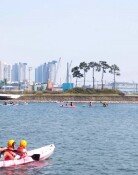The morning of June 25
The morning of June 25
Posted June. 23, 2020 07:40,
Updated June. 23, 2020 07:40

Before the outbreak of the Korean War, the South Korean forces had eight divisions consisting of 95,000 soldiers in total, and four of them were dispatched along the 38th parallel north. North Korea, on the other hand, had 10 divisions of 175,000 soldiers, about 80,000 more than its neighbor and had dispatched seven of them to the front line together with tank brigades. The fact that Pyongyang had 242 tanks while Seoul had none is often cited to illustrate the difference in military strength between the two nations, but another critical factor was the firepower of artillery. Field guns are much more important in modern warfare than people think. North Korea had six times stronger artillery than South Korea.
On the day the war broke out, things got even more bizarre. Large units of the North Korean forces were gathered along the 38th parallel north to wage war, which was a clear sign of an impending war. Upon being reported, the leaders sent an intelligence unit to confirm it, and the intelligence unit stumbled upon North Korean soldiers while conducting reconnaissance. In fact, the South Korean forces had introduced a state of military alert for a month after noticing unusual activity but had removed it on Wednesday. The half of the forces were granted time off as a reward while major generals of divisions were in Seoul to attend a gathering on Thursday, which is a famous story. A less known fact is that major commanding officers had been replaced about a month ago. Commanders are replaced on a regular basis, but they should not be replaced all at once. All of them were not aware of the troops let alone what was going on in the field.
While the North Korean forces were twice stronger than the South Korean forces, the defense strategies of the South were not realistic either. The regiments were deployed in an inefficient manner, and the second and third defense lines were not established according to former General Paik Sun-yup. One does not start a war even if it knows its military is stronger, if the other has a formidable defense system. One starts a war when it knows the other is not prepared. Probably, this is a lesson we should learn from the Korean War.
tjdrud0306@donga.com







